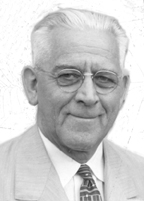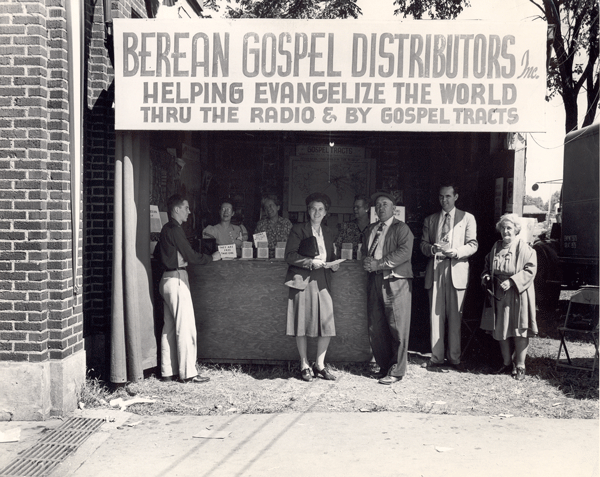Gaylord Ford Porter
“No church, no lodge, no good works can save you. Remember, God does the saving. All of it!”
(God’s Simple Plan of Salvation)
Early Life and Calling
Ford Porter—whose full name was Gaylord Ford Porter—was born on February 5, 1893, in Ottawa County, Michigan. Raised in a home where his parents maintained a consistent “family altar,” he professed faith in Christ at the age of 11. Even in his youth, Porter demonstrated a remarkable memory for Scripture; at 12 he was noted for knowing more Bible verses than anyone else in his community.
From a young age he felt drawn to a life of service. After high school, he assisted in missions—serving at a Rescue Mission in Evansville, Indiana, under the ministry of Dr. Ernest Reveal. On July 6, 1919, at age 26, he formally answered what he described as God’s call to preach. He then pursued further training, enrolling at the Moody Bible Institute in Chicago where he studied under Drs. Kenneth Wuest and James M. Gray.
Ministry Beginnings – Pastoral Work and Tract Writing
Porter’s early ministry included a number of church pastorates in Indiana, where he refined his preaching, teaching, and evangelistic craftsmanship. But arguably the turning point came with his entry into gospel-tract ministry—an avenue that would define much of his legacy. In 1933 he wrote what became his most enduring tract, titled God’s Simple Plan of Salvation. This short, clear gospel presentation circulated widely—and over time was translated into more than 90 languages, including Braille, and printed in hundreds of millions of copies (310 + million by some estimates). The tract’s immense distribution marked Porter not just as a pastor or evangelist, but as a pioneer in gospel publishing and global outreach.
Founding of Berean Gospel Ministry
In 1947 Porter launched the Berean Gospel Ministry (which later became known as Lifegate, Inc.). This ministry embraced a variety of tools: tract distribution, evangelistic campaigns, radio broadcasts, children’s Bible crusades, film evangelism, a vacation-Bible-school institute, and the beginning of a Christian college in Indiana. His strategy was holistic—reaching children, youth, adults, local communities, and nations abroad. Camp Berean (later Camp Berean/CHILDREN’S Bible Crusade), Vacation Bible School Institutes, gospel films—all under the umbrella of his ministry—demonstrated that he was willing to use mass communication and media (in the broad sense) to carry a simple message: Jesus Christ saves.
Ministry Philosophy and Character
Porter’s hallmark was simplicity combined with breadth. He believed in presenting the gospel clearly (“God’s simple plan”), but also reaching widely—to the ends of the earth—via tracts, radio, film, and children’s ministry. His conviction was that materials that proclaim Christ should be available in many languages and formats. Despite the wide reach of his ministry, accounts of Porter highlight his humble roots and consistent character. From his early years as a Sunday-school teacher and junior-leader, to publishing millions of tracts, his ministry was rooted in the local church and individual souls rather than mere institutional grandeur.
Legacy and Influence
Ford Porter passed away on November 20, 1976, at the age of 83.
His death marked the end of an era—but his influence continues in several key ways:
- Global Tract Distribution: The reach of God’s Simple Plan of Salvation remains extraordinary—over 90 languages, over 300 million copies. That means many believers today encountered the gospel first in a copy of that tract.
- Media-Minded Evangelism: Porter modelled an effective use of mass-communication tools for evangelistic ends—radio, film, printed tracts, youth crusades. That model spilled into many subsequent evangelical ministries.
- Children’s and Youth Outreach Emphasis: His ministry showed that children’s ministry, vacation Bible school, camps and film evangelism were not afterthoughts but integral to gospel strategy.
- Holistic Ministry Vision: Rather than focusing purely on pulpit work, Porter combined evangelism, publishing, discipleship and media. Many ministries today echo that multi-avenue approach.
- Standard of Simplicity and Faithfulness: His message remained simple: Jesus saves, believe and be born again. He refused to swamp the message with extraneous theory—something that gives his legacy staying power.
Practical Lessons
From Porter’s life and ministry one can draw practical lessons:
- Don’t underestimate tracts and simple gospel materials. Porter showed that a small printed gospel tract can have worldwide reach and lasting impact.
- Use available media strategically. Even in the mid-20th-century, Porter embraced radio, film and children’s outreach. Today’s ministry leaders can follow his example adapting to current media.
- Keep the gospel central. Porter’s message never wandered into secondary issues; his focus remained: Christ, the cross, salvation.
- Invest in the young. Porter spent resources on children’s crusades and youth institutes, recognizing that the next generation must be reached.
- Think globally while serving locally. His ministry started with local pastorates but widened into global distribution. Local service and global vision can go hand in hand.
Reflections and Significance
In an era when evangelical outreach was expanding in new ways, Porter stands as a figure who bridged the local church and the world, the simple gospel and mass distribution, and the youth ministry and adult outreach. His legacy is not simply measured in institutions or programs, but in the number of gospel-fresh decisions for Christ, the languages reached, the tracts handed out, the youth ministries inspired, and the global footprints left.
For those who value missionary strategy, gospel publishing, children’s ministry, and the broad reach of the Word, Ford Porter offers a model of ministry that is at once humble, creative, simple and effective. He reminds us that great impact does not always require grand complexity: a clear message, a willing heart, and consistent distribution may suffice.
Conclusion
Ford Porter’s life—born in Michigan in 1893, saved as a youth, called to preach, trained at Moody Bible Institute, pastored church, authored one of the most-widely distributed gospel tracts, founded Berean Gospel Ministry, embraced media, youth, evangelism—represents a distinctive chapter in evangelical history. His legacy remains alive in the millions of gospel tracts still read, in ministries that follow his model of simplicity plus mass outreach, and in the countless lives changed by a small printed page.
In the words of a much-used motto in evangelical publishing: “The greatest single thing you can do for God is to share the gospel with someone.” Ford Porter lived that out. May his story encourage others to do likewise—faithfully, simply, globally.
_____
Image Source/Credit (in order):
- Pastor Ford Porter—Man of God! www.jesus-is-savior.com/Great%20Men%20of%20God/pastor_ford_porter.htm.
- “About | Gods-simple-plan.” Gods-simple-plan, www.godssimpleplan.org/about.
- “About | Gods-simple-plan.” Gods-simple-plan, www.godssimpleplan.org/about.
Related
Sorry, no records were found. Please adjust your search criteria and try again.
Sorry, unable to load the Maps API.


